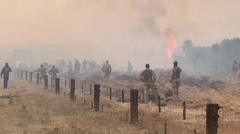The British Army Training Unit Kenya (Batuk) has reached a settlement after a protracted legal struggle involving 7,723 claimants who reported loss of property and health issues stemming from a fire that erupted during a military exercise in March 2021.
A spokesperson for the British High Commission in Nairobi described the incident as "extremely regrettable," noting the UK’s strong commitment in resolving the claims. Although the exact compensation amount has not been disclosed, it is reported to be approximately £2.9 million.
Kevin Kubai, the attorney representing the claimants, emphasized that the out-of-court settlement was the "best possible outcome," despite many clients feeling the compensation amounts did not adequately reflect their losses. He highlighted that pursuing further legal action could have taken nearly seven additional years, compounded by the loss of crucial evidence over time.
Kubai also acknowledged the challenge his clients faced in documenting health issues linked to the smoke inhalation from the fire, particularly as many relied on firewood for cooking, which complicated their health claims.
An investigation by the UK Ministry of Defence concluded that the fire was likely triggered by a camp stove overturned during the military training, leading to extensive damage over approximately 7,000 acres (2,800 hectares) of private land, while community lands remained largely unaffected.
Claimants argued that the environmental fallout from the fire had repercussions on surrounding areas due to resultant smoke and the destruction caused by stampeding wildlife as they fled the blaze.
Beyond the compensation, the British government has been aiding in the restoration of the damaged areas while military training exercises continue within the conservancy. The Lolldaiga conservancy, encompassing about 49,000 acres of scenic bushland and near the historical colonial land disputes, lies just 70 kilometers from notable locations like the Lewa conservancy, known for its association with the British royal family.
Despite being a significant economic contributor to Kenya, Batuk has faced scrutiny over incidents involving British soldiers, including allegations of misconduct and serious crimes, which have dominated headlines over the years, further complicating the dynamics of military presence in the region.
A spokesperson for the British High Commission in Nairobi described the incident as "extremely regrettable," noting the UK’s strong commitment in resolving the claims. Although the exact compensation amount has not been disclosed, it is reported to be approximately £2.9 million.
Kevin Kubai, the attorney representing the claimants, emphasized that the out-of-court settlement was the "best possible outcome," despite many clients feeling the compensation amounts did not adequately reflect their losses. He highlighted that pursuing further legal action could have taken nearly seven additional years, compounded by the loss of crucial evidence over time.
Kubai also acknowledged the challenge his clients faced in documenting health issues linked to the smoke inhalation from the fire, particularly as many relied on firewood for cooking, which complicated their health claims.
An investigation by the UK Ministry of Defence concluded that the fire was likely triggered by a camp stove overturned during the military training, leading to extensive damage over approximately 7,000 acres (2,800 hectares) of private land, while community lands remained largely unaffected.
Claimants argued that the environmental fallout from the fire had repercussions on surrounding areas due to resultant smoke and the destruction caused by stampeding wildlife as they fled the blaze.
Beyond the compensation, the British government has been aiding in the restoration of the damaged areas while military training exercises continue within the conservancy. The Lolldaiga conservancy, encompassing about 49,000 acres of scenic bushland and near the historical colonial land disputes, lies just 70 kilometers from notable locations like the Lewa conservancy, known for its association with the British royal family.
Despite being a significant economic contributor to Kenya, Batuk has faced scrutiny over incidents involving British soldiers, including allegations of misconduct and serious crimes, which have dominated headlines over the years, further complicating the dynamics of military presence in the region.


















